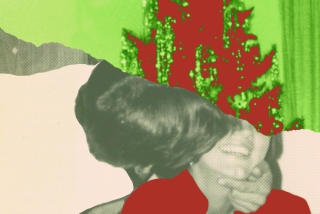AIDS Keeps Expanding Its Deadly Reach : Victims: Family members of two who have died of disease talk about its effects on their loved ones.
- Share via
She was a pretty divorcee with a 12-year-old son, a secretarial job and a budding social life.
For the first time since her marriage broke up nine years back, the soft-spoken 35-year-old was dating, going dancing, enjoying life. And sometimes, her older sister said, she liked to visit singles’ bars.
He was a part-time college student who spent the past five years living with a wealthy boyfriend in Corona del Mar. Rakishly handsome, he loved expensive clothes, stylish cars, elegant parties, trips to Paris.
Though their lifestyles were worlds apart, the attractive brunette and the dashing young man met a similar death: Both died of AIDS at a Laguna Beach hospice called Ahimsa. They were among 311 people in Orange County last year who were killed by AIDS or its complications.
The woman’s parents are ashamed their daughter died from a sexually transmitted disease. They refuse to tell friends what happened. The woman’s son has been told his mother died of leukemia. And her older sister asked that the woman be identified only as Darlene.
By contrast, the mother of 28-year-old Brock Douglas believes the world should know what happened to her eldest son. “I want people to realize that AIDS is something real,” said Duchess Heitman. “This is not a homosexual disease. This killed my child.”
For several months Darlene had dated a fellow office worker. But she didn’t feel well, her sister said. She had a persistent case of herpes. And at a routine checkup in February, 1987, she asked to be tested for the AIDS virus. Several days later, a secretary phoned back, saying casually, “Oh, that test was positive.”
Darlene spent the weekend in hysterics. Through an AIDS hot line, she and her older sister got the name of a more compassionate infectious-disease specialist who confirmed the diagnosis.
Darlene continued to work as a secretary and to care for her son. She also told her boyfriend that she had tested positive for the AIDS virus. He got tested too, came up negative and they continued dating. Darlene also alerted several former boyfriends. They too tested negative. In the end, her older sister said, “She did not know who gave it to her.”
That May, Darlene was hospitalized for three weeks with a severe pneumonia that often accompanies AIDS.
Over the next two years, her health steadily declined. Her weight dropped from 125 to 110 pounds. She lost her hair. She was hospitalized again for pneumonia and, later, for tuberculosis. She also developed a virus in her eye that would leave her blind.
By early 1989, she stopped working, and by mid-1989, Darlene was too ill to remain in her Long Beach apartment. She moved in with her mother in Carson, but later that year, when her mother suffered a heart attack, Darlene was moved to the Laguna Beach nursing home where she died.
Darlene was “very, very brave” on her “long journey to death,” her sister related. When her hair fell out, she styled it in a “pixie cut” and “she joked with her doctor, ‘Do you know anyone interested in a balding, single female who is going blind?’ ”
Mostly Darlene remained hopeful, although once, when she learned a friend had died of AIDS, she burst into tears, crying, “You know this is how it’s going to end for me.” Mostly, Darlene braved her illness alone, talking only to her family and a few friends. She went to an AIDS support group once--”all gays”--and never wanted to go back, her sister said.
In her last weeks at Ahimsa, Darlene suffered the dementia that can accompany AIDS. “She would call during the day, hysterical that someone had stolen her radio. And a nurse would get on and say the radio’s right next to her,” her sister said. On Feb. 2, 1990, she died of pneumonia. Six months later, her family gave her clothing and furniture to a Long Beach AIDS group. Some day, Darlene’s sister said, she would like to do volunteer work for AIDS groups but not now. “It’s so depressing. I’m not ready for that yet.”
Brock Douglas was “too good-looking for his own good,” his mother, Duchess Heitman, said.
When he was a baby, “people used to stop me in the street to say how beautiful he was with his big dimples and his hazel eyes.”
In high school, there were many girlfriends, many friends of both sexes. And in 1981, his mother said, when Douglas returned from Holland after a year as an exchange student, young men came to the house, courting her now-openly homosexual son.
Douglas seemed to live a charmed life, his mother said. He went to college part time, worked as a waiter and “hung around with people with lots of money who really liked him. He went to Paris on the Concorde. He bought his clothes at Giorgio Armani. . . . He wore a $2,000 watch. He had to look impeccable all the time.” Even when he moved in with a young man from Corona del Mar, he continued that active social life, she said.
Heitman said she accepted her son’s homosexuality but repeatedly warned him about AIDS. His response was denial. “When I asked him to be tested, he didn’t want to be tested,” she said. “He didn’t want to know.” But in June, 1989, he contracted pneumonia. One month later, he took the blood test for the AIDS virus and tested positive.
That August, Heitman said, the AIDS nightmare began in earnest. Douglas went berserk. Out of the blue, he rented a car, drove to Arizona, called home, said he was getting married, then drove back to California, ditched the car, and appeared at her Redlands home barefoot and shirtless, saying he had just walked there from the Ontario airport.
Heitman and another son took Douglas to the nearest emergency room. Douglas had AIDS encephalitis. He was moved to a psychiatric hospital, then to a board-and-care home, and later, to Heitman’s home with nurses around the clock before going to the hospice.
He had recovered from the encephalitis, Heitman said, but he remained very ill. And, allergic to the drugs meant to combat AIDS, “he refused the medication,” Heitman said. “He just wanted to die.”
In the end, Heitman said, she got a conservatorship over him that enabled her to follow his wishes, to refuse medication. He finally died just before his 29th birthday, on July 5, 1990. At his wish, Heitman said, her son was cremated and his ashes were sprinkled “just beyond his favorite beach, West Beach” in South Laguna.
More to Read
Sign up for Essential California
The most important California stories and recommendations in your inbox every morning.
You may occasionally receive promotional content from the Los Angeles Times.













